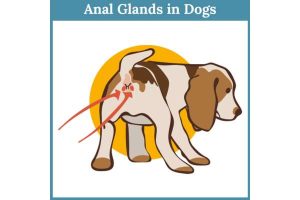One of the most debated topics in veterinary medicine is the removal of dog glands, also known as anal sacs. This procedure involves surgically removing these small pouches located on either side of a dog’s anus.
While some argue that dog gland removal can alleviate various health issues and improve a dog’s overall well-being, others question the necessity and potential risks associated with this procedure.

To provide an objective analysis of this topic, this article will examine the advantages and disadvantages of dog gland removal, explore alternative treatments available, and highlight important considerations for pet owners before making a decision.
By presenting both sides of the argument without personal bias or pronouns, this article aims to inform readers about the pros and cons related to dog gland removal, ultimately empowering them to make informed choices regarding their pets’ healthcare.
Advantages of Dog Gland Removal
Advantages of dog gland removal include:
- Prevention of painful anal gland infections: The procedure removes the anal glands, which can become impacted or infected, causing discomfort and pain for the dog. By removing these glands, the risk of infections is greatly reduced, improving the overall well-being of the animal.
- Short recovery time: Most dogs will experience minimal post-operative discomfort and will resume normal activities within a few days to a week after surgery.
- Cost savings: While there may be some initial cost associated with the surgery itself, it can save pet owners money in the long run by preventing recurrent infections that would require expensive veterinary treatments.
In conclusion, dog gland removal offers the advantages of preventing painful infections, providing a relatively quick recovery time, and potential cost savings for pet owners through long-term prevention of recurring infections.
Disadvantages of Dog Gland Removal
A potential drawback of undergoing dog gland removal is that it may leave a void in the overall health and well-being of canines. While the procedure itself may provide immediate relief from discomfort or infection, there are long-term effects and potential complications to consider.

One such effect is the disruption of natural bodily functions. Anal glands play a role in maintaining proper bowel movements, and their removal could lead to issues such as constipation or fecal incontinence.
Additionally, some dogs may experience chronic irritation or inflammation at the surgical site, which can cause ongoing discomfort. Moreover, without regular emptying of anal glands, there is a risk of them becoming impacted or infected in the future.
It is essential for dog owners to carefully weigh these disadvantages before opting for gland removal surgery.
Alternatives to Dog Gland Removal
Possible alternatives to dog gland removal surgery include anal gland expression performed by a veterinarian, dietary changes to promote healthy bowel movements, and the use of topical creams or ointments to alleviate discomfort and inflammation. These natural remedies aim to address the underlying causes of anal gland issues without resorting to surgery.

One alternative is anal gland expression, a procedure in which a veterinarian manually squeezes the glands to release their contents. This can help relieve blockages and prevent infection. Another option is making dietary changes that promote regular bowel movements, such as increasing fiber intake or switching to a high-quality dog food that supports digestive health. Additionally, topical creams or ointments containing soothing ingredients like aloe vera or witch hazel can provide temporary relief from discomfort and inflammation.
Consider the following table for an overview of these alternatives:
| Alternative | Description |
|---|---|
| Anal Gland Expression | Manual squeezing of glands by a veterinarian |
| Dietary Changes | Increasing fiber intake or switching to high-quality dog food |
| Topical Creams/Ointments | Application of soothing products containing ingredients like aloe vera or witch hazel |
These alternatives offer potential solutions for managing anal gland issues in dogs without undergoing surgical intervention. However, it is essential to consult with a veterinarian before implementing any changes in order to ensure proper care for your pet’s specific needs.
Considerations Before Making a Decision
Considerations that need to be taken into account before deciding on a course of action include the potential risks and benefits of surgical intervention, the severity and frequency of anal gland issues, and the overall health and well-being of the dog. It is important to weigh the pros and cons carefully in order to make an informed decision.
- Cost implications: Surgical removal of dog glands can be expensive, especially if complications arise during or after the procedure. Pet owners should consider their financial situation and whether they are able to afford the surgery and any potential follow-up care.
- Potential health risks: Surgery always carries some degree of risk, including infection, bleeding, adverse reactions to anesthesia, or damage to surrounding tissues. It is crucial to consult with a veterinarian about these potential risks and determine if they outweigh the benefits.
Considering these factors will aid in making a thoughtful decision that prioritizes both the dog’s well-being and financial feasibility.
Conclusion and Final Thoughts
Taking into account the various factors mentioned above, it is crucial to carefully evaluate the potential risks and benefits associated with surgical intervention for anal gland issues in dogs before making a decision.
While anal gland removal may provide relief from recurrent infections and discomfort, it is important to consider the potential complications that can arise from the procedure, such as infection, bleeding, or damage to surrounding tissues. Additionally, there is a risk of long-term complications such as fecal incontinence or altered bowel habits.
On the other hand, if non-surgical methods fail to alleviate the issue and the dog’s quality of life is significantly impacted by chronic anal gland problems, surgery may be warranted. However, owners should consult with their veterinarian and weigh these pros and cons carefully.
In conclusion, it is essential to consider all aspects of anal gland removal surgery before making a decision that could have an overall impact on the dog’s well-being.
See also:
How To Express Dog Anal Glands
Dog Period Pads Benefits & Selection Tips
5 Crucial Items To Have In Your Dog First Aid Kit: Must-Have Items for Pet Parents
Frequently Asked Questions
How long does the recovery process usually take after dog gland removal surgery?
The recovery time after dog gland removal surgery varies depending on the individual dog and the specific procedure performed. Postoperative care, including pain management, wound care, and monitoring for complications, is crucial in ensuring a successful recovery.
Are there any potential long-term health risks associated with dog gland removal?
Long-term health risks associated with dog gland removal include the potential for fecal incontinence, anal muscle damage, and recurring infections. However, there are also benefits such as alleviating chronic anal gland issues and reducing discomfort for the dog.
Can dog gland problems be managed without surgery?
Natural alternatives and dietary changes can be effective in managing dog gland problems without surgery. These methods aim to address underlying causes, such as diet and nutrition, to promote overall gland health and reduce the need for invasive interventions.
Are there any natural remedies or treatments that can help alleviate dog gland issues?
Natural remedies and alternative treatments can help alleviate dog gland issues. These include dietary changes, increased fiber intake, regular exercise, and gland expression techniques. However, consulting with a veterinarian is crucial to determine the most effective approach for each individual case.
How often do dog gland problems recur after surgery?
The success rate of dog gland surgery varies depending on factors such as the type of procedure and the individual dog’s health. Postoperative care is crucial in preventing recurrence of gland problems and may include dietary changes and regular veterinary check-ups.
